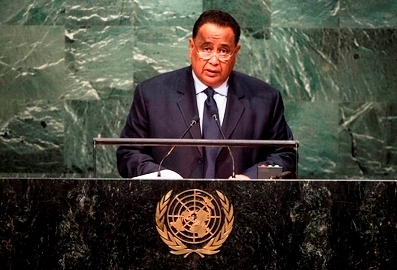Ghandour decries negative impact of U.S. Sanctions on Sudan’s economy
October 27, 2015 (NEW DELHI) – Sudan’s foreign minister Ibrahim Ghandour has complained about the negative impact of external debt and the American economic and financial sanctions on the east African country.

Washington has imposed economic and trade sanctions on Sudan in 1997 in response to its alleged connection to terror networks and human rights abuses. Also, some western countries including the United States expressed readiness to offer debt relief but political conditions attached slow down the materialisation of the pledges.
Sudan’s external debt is estimated to be around $46 billion. Khartoum says it has completed technical and economic requirements for debt cancellation but observers assert that it is difficult for Sudan to secure it without Western backing.
Sudan’s top diplomat said the government seeks to unify the national front and open a wide dialogue among the political parties and the civil society organizations in order to support democracy and the peaceful transfer of power and to lay the foundations for good governance.
He also said the government made huge efforts to achieve peace across the country particularly in Darfur, pointing to the Doha Document for Peace in Darfur (DDPD) and the support of the African Union.
Ghandour renewed Sudan’s call for reforming the United Nations institutions especially the UN Security Council (UNSC) in order to make the international body more representative, noting it is a pivotal issue in his country’s foreign policy agenda.
The foreign minister pointed to the cooperation between Sudan and India at bilateral and regional levels besides coordination within the international organizations on several issues including international law, UN charter, states sovereignty, democracy and the rule of law, rejection of hegemony and the unilateral sanctions.
He praised the Indian experience in various fields of including the small and medium industries, software, energy, oil and agricultural research, calling for developing, modernizing and activating the banking system between India and Africa by using the African currencies and the Rubee in financial transactions.
Ghandour thanked the Indian government for applying preferential tariff system on the African products, saying the move would double trade exchange between India and Africa.
He added the approval of the 2030 sustainable development plan and the African 2063 development plan would encourage the African and Indian sides to carry out more coordination and joint action, saying his government implemented long and short-term programs in order to achieve sustainable and balanced social and economic growth.
(ST)
